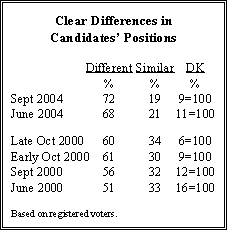 A large majority of voters (72%) believe that Bush and Kerry take different positions from each other on the issues, compared with 19% who see their positions as similar. That is up slightly from June, when 68% saw differences between the candidates’ positions.
A large majority of voters (72%) believe that Bush and Kerry take different positions from each other on the issues, compared with 19% who see their positions as similar. That is up slightly from June, when 68% saw differences between the candidates’ positions.
Far more voters see clear distinctions between the candidates than did so four years ago. At the end of the 2000 campaign, just 60% said George Bush and Al Gore took different positions on the issues. At this stage in 2000, 56% said the candidates took different positions.
However, while more voters perceive differences in positions taken by the candidates, a sizable minority (31%) says the candidates are not talking about the issues that matter to them.
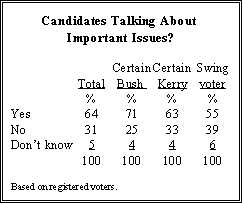 In September 2000, a smaller number (22%) said the candidates were not addressing the issues that matter to them, while 72% said they were talking about those issues.
In September 2000, a smaller number (22%) said the candidates were not addressing the issues that matter to them, while 72% said they were talking about those issues.
Committed Bush voters are significantly more satisfied with the focus of the campaign than are Kerry voters or swing voters. Seven-in-ten Bush voters (71%) say the candidates are talking about the issues that are important to them, compared with 63% of certain Kerry voters. Slightly more than half of swing voters (55%) think the campaigns are talking about the important issues.
Kerry’s Bad Month
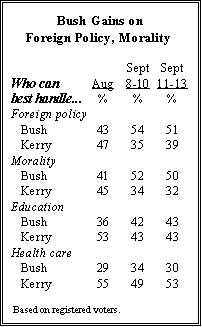 Last month, following the Democratic convention, Kerry enjoyed a sizable advantage over Bush on most domestic issues and held his own with the president on foreign policy and Iraq. The only issue on which he trailed Bush by a statistically significant margin was terrorism. For his part, Bush held a decided edge on most positive personal characteristics, including strong leadership.
Last month, following the Democratic convention, Kerry enjoyed a sizable advantage over Bush on most domestic issues and held his own with the president on foreign policy and Iraq. The only issue on which he trailed Bush by a statistically significant margin was terrorism. For his part, Bush held a decided edge on most positive personal characteristics, including strong leadership.
But the dynamics of the race shifted, and Bush moved out to significant leads on handling Iraq, improving the nation’s moral climate and making wise decisions about foreign policy. Equally important, Bush eliminated Kerry’s sizable edge on education. However, Bush has been unable to make inroads into Kerry’s big advantage on health care.
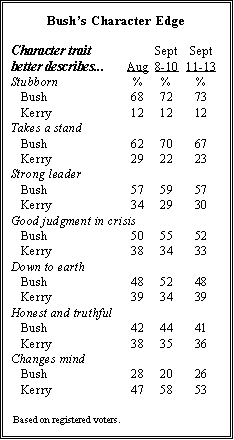 Bush also continues to lead on most key character traits. By a substantial margin, he is seen as the candidate “willing to take a stand, even if unpopular.” He also is widely viewed as “a strong leader”; the candidate who would “use good judgment in a crisis”; and “down to earth.” Kerry’s standing on these character traits has not improved since August, nor did they change significantly in the second wave of September polling.
Bush also continues to lead on most key character traits. By a substantial margin, he is seen as the candidate “willing to take a stand, even if unpopular.” He also is widely viewed as “a strong leader”; the candidate who would “use good judgment in a crisis”; and “down to earth.” Kerry’s standing on these character traits has not improved since August, nor did they change significantly in the second wave of September polling.
Where Kerry has made progress recently is on voter assessments of which candidate is “personally likable.” In August, about the same number said that phrase described Bush as said Kerry (43% vs. 41%), but Bush took an 18-point lead on this measure in polling conducted Sept. 8-10 (51%-33%). That lead dissipated in the most recent interviewing, and the candidates are again about even on this question. In addition, a plurality of voters now says the phrase “cares about people like me” better describes Kerry than Bush (46% vs. 38%). Bush had drawn virtually even with Kerry in the initial September polling, but Kerry has regained the small lead he held in August.
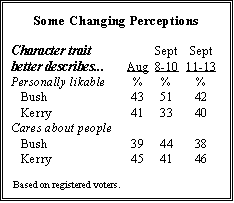 In terms of negative traits, the vast majority of voters continue to perceive Bush rather than Kerry as “stubborn.” And most say the phrase “changes his mind too much” applies to Kerry rather than Bush, though the number declined slightly in the second wave of interviewing.
In terms of negative traits, the vast majority of voters continue to perceive Bush rather than Kerry as “stubborn.” And most say the phrase “changes his mind too much” applies to Kerry rather than Bush, though the number declined slightly in the second wave of interviewing.
Leadership Key for Bush
Typically, voters rate issues as the most important factor both positively and negatively in their decision on whom to support. This is certainly the case for Kerry 52% of his supporters cite his stance on the issues as what they like most about him. And about the same number of Kerry’s opponents (53%) say his position on the issues is what they like least about him.
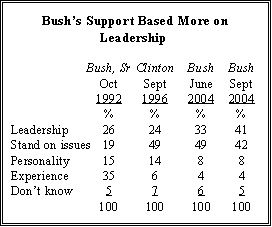 But Bush is a singular exception. Among his supporters, Bush’s leadership qualities are cited as often as his issue stances as the most important factor shaping their preference (41% leadership, 42% issues). Leadership also is frequently pointed to by Bush’s opponents as what they like least about him, although more mention issues (by 46% to 28%).
But Bush is a singular exception. Among his supporters, Bush’s leadership qualities are cited as often as his issue stances as the most important factor shaping their preference (41% leadership, 42% issues). Leadership also is frequently pointed to by Bush’s opponents as what they like least about him, although more mention issues (by 46% to 28%).
Dating back to 1992, no candidate’s support has been as heavily predicated on his leadership. In 1996, when Clinton ran for reelection, his supporters overwhelmingly cited his stance on issues as the most important factor (49% vs. 24% leadership). And when Bush’s father ran for a second term in 1992, a plurality of his supporters cited his experience. Issues were a relatively minor factor in support for Bush Sr. Just 19% mentioned issues, compared with 68% of Clinton’s supporters in the 1992 campaign.
Candidate Impressions
Overall, most voters agree with the statement: “John Kerry changes his mind too much.” But somewhat fewer people expressed this sentiment in the latter stage of polling than in the first phase (53% vs. 59%).
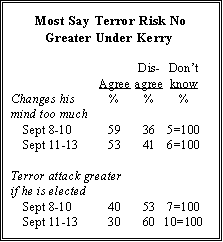 There also was a modest shift in opinion on the statement “The chance of another terrorist attack would increase if John Kerry were elected.” Voters disagreed with this statement by a 53%-39% margin in the survey’s first wave, but by a greater margin subsequently (60%-30%).
There also was a modest shift in opinion on the statement “The chance of another terrorist attack would increase if John Kerry were elected.” Voters disagreed with this statement by a 53%-39% margin in the survey’s first wave, but by a greater margin subsequently (60%-30%).
As might be expected, there is a considerable degree of partisanship in these attitudes. A solid majority of Bush supporters (64%) believes that the risk of terrorism would increase if Kerry is selected. Kerry’s supporters disagree (86%), and 56% completely disagree.
A narrow majority of all voters (52%) agree with the statement: “John Kerry is an anti-war candidate.” Roughly seven-in-ten certain Bush voters (71%) agree with the statement, but there is a substantial measure of division among committed Kerry voters: 39% agree that he is an “anti-war candidate,” while 53% disagree.
A similar pattern is evident in perceptions of Bush, which did not change significantly through the polling period. Roughly six-in-ten voters (58%) agree that it is “not clear what George W. Bush is going to do about Iraq if he is reelected.” While a large majority of Kerry voters agree with this statement (82%), so do a sizable minority of committed Bush voters (32%).
Majorities of voters also agree that Bush “seems like a real person rather than a politician,” and with the statement: “I like the fact that George W. Bush doesn’t over-complicate issues.” But committed Kerry supporters overwhelmingly disagree with both of these positive sentiments about Bush.
The statement “I worry that George W. Bush will take America into another war” triggers the most intense reaction among Kerry supporters. Nearly nine-in-ten certain Kerry voters agree with this statement, and 60% completely agree. Committed Bush supporters reject this statement by a five-to-one margin (80%-16%).
Swing Voters’ Impressions
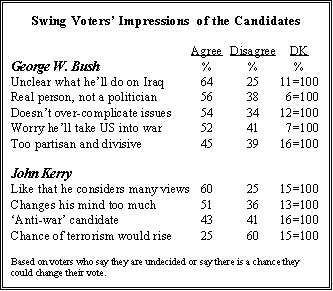 For the most part, swing voters are not significantly different from the rest of the electorate in their impressions of the candidates. For example, a large majority of swing voters (64%) agree with the statement: “It’s not clear what George Bush is going to do about Iraq if he is reelected.”
For the most part, swing voters are not significantly different from the rest of the electorate in their impressions of the candidates. For example, a large majority of swing voters (64%) agree with the statement: “It’s not clear what George Bush is going to do about Iraq if he is reelected.”
Most swing voters also agree with positive characterizations of Bush’s personality that he does not over-complicate issues and that he is “a real person rather than a politician.”
Swing voters also tend to agree with the positive characterization of Kerry: “I like the fact that John Kerry considers many points of view when making a decision.” However, about half (51%) also believe he changes his mind too much. Just a quarter of swing voters agree that the chance of terrorism would increase if Kerry is elected president.
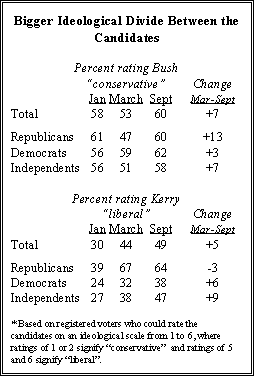
More Ideological Views of Bush and Kerry
Somewhat more voters view Bush as conservative and Kerry as liberal than did so earlier this year. Among those who can rate President Bush, 60% place him at the conservative end of the six-point conservative-liberal scale (points 1 or 2). This is up from March of this year (53%). Similarly, slightly more voters place John Kerry on the liberal side of the scale (points 5 and 6) now (49%) than in March (44%).
Republicans, Democrats, and independents all see Bush as conservative, though more Republicans today than in March hold this perception (the percentage placing him on the conservative end of the scale rose from 46% to 59%). But views of Kerry’s ideological leanings are very different across partisan groups. Just 38% of Democrats see him as liberal (up six points since March), while 64% of Republicans view him this way (down 3 points). Almost half of independents now see him as liberal (47%, up from 38% in March).


